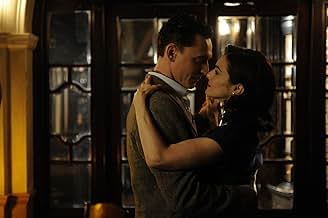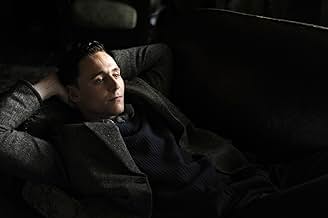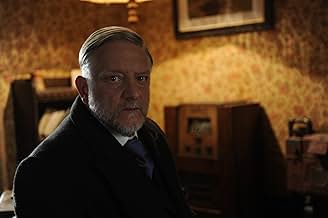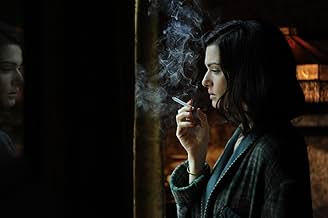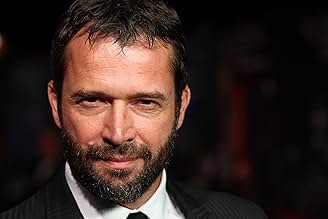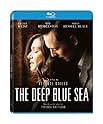The wife of a British Judge is caught in a self-destructive love affair with a Royal Air Force pilot.The wife of a British Judge is caught in a self-destructive love affair with a Royal Air Force pilot.The wife of a British Judge is caught in a self-destructive love affair with a Royal Air Force pilot.
- Director
- Writers
- Stars
- Awards
- 5 wins & 13 nominations total
Jorge Ojeda-Dávila
- Man in Bunker Bed
- (uncredited)
Owen Thomas
- Caretaker
- (uncredited)
- Director
- Writers
- All cast & crew
- Production, box office & more at IMDbPro
Featured reviews
THE DEEP BLUE SEA is set in the 1950′s and flashes back to the War years of the 40′s – so it is appropriate that the title also features in a popular song lyric of the time ' we are all between perdition and the deep blue sea'.
London in 1950 was still very much showing the effects of the War and amid this drab and shattered cityscape, in a small dingy flat, Hester ( Rachel Weisz) has decided to commit suicide using the gas meter, but is revived. Hester had been married to the wealthy but tightly wound Judge, Sir William Collyer, but left him to live with a dashing ex RAF pilot, Freddie Page. The story takes place over a single day about ten months after Hester leaves her husband.
This was originally a Terence Rattigan play that first went to screen in the 1950′s with Vivian Leigh in the lead role and Kenneth More as Freddie and Eric Portman as the stern judge. Rachel Weisz is nothing short of incandescent in the part. She is a polished, accomplished actress who keeps getting better as she goes on. Hester has taken what many would say, a wild and foolish step in leaving her safe and affluent husband for the feckless Freddie and a relationship that while initially passionate, intense and thrilling, is ultimately doomed, as less than a year after the move, Freddie is more centred on drinking in pubs and playing golf while Hester sits forlorn and neglected in a shabby, dingy flat. It is her birthday, Freddie has forgotten. She is alone.
The editing, direction and cinematography are extremely good. Two scenes remain with me for poignancy. In a flashback to the Blitz, Hester and Sir William take shelter in a tube station, huddled with other cold and weary Londoners. Above, the bombs rain down thunderously upon their city, while on the platform, a lone soldier sings 'Molly Malone'. The other has Hester and Freddie dancing in a pub, smoke sits heavy on the air, the light is fractured through the window slats and the Jo Stafford song that was so popular at the time ' You Belong To Me' has the patrons singing with it.
The film was both written and directed by Terence Davies. Perhaps because both Terences ( Rattigan and Davies) were / are gay men, there is a nuanced sympathy for Hester whose life from its start as a Vicar's daughter, through to her marriage to a hidebound upper class man whose mother loathed her as unfit for him, and culminating in her last chance at happiness and love being smashed because Freddie is a shallow and fickle man whose greatest time was as a RAF pilot during the Blitz and he will never move on from that.
A mature, well crafted film, with occasional echoes of BRIEF ENCOUNTER, it has many strong points, but none stronger than Rachel Weisz. 3 and a half stars.. filmnotion.com
London in 1950 was still very much showing the effects of the War and amid this drab and shattered cityscape, in a small dingy flat, Hester ( Rachel Weisz) has decided to commit suicide using the gas meter, but is revived. Hester had been married to the wealthy but tightly wound Judge, Sir William Collyer, but left him to live with a dashing ex RAF pilot, Freddie Page. The story takes place over a single day about ten months after Hester leaves her husband.
This was originally a Terence Rattigan play that first went to screen in the 1950′s with Vivian Leigh in the lead role and Kenneth More as Freddie and Eric Portman as the stern judge. Rachel Weisz is nothing short of incandescent in the part. She is a polished, accomplished actress who keeps getting better as she goes on. Hester has taken what many would say, a wild and foolish step in leaving her safe and affluent husband for the feckless Freddie and a relationship that while initially passionate, intense and thrilling, is ultimately doomed, as less than a year after the move, Freddie is more centred on drinking in pubs and playing golf while Hester sits forlorn and neglected in a shabby, dingy flat. It is her birthday, Freddie has forgotten. She is alone.
The editing, direction and cinematography are extremely good. Two scenes remain with me for poignancy. In a flashback to the Blitz, Hester and Sir William take shelter in a tube station, huddled with other cold and weary Londoners. Above, the bombs rain down thunderously upon their city, while on the platform, a lone soldier sings 'Molly Malone'. The other has Hester and Freddie dancing in a pub, smoke sits heavy on the air, the light is fractured through the window slats and the Jo Stafford song that was so popular at the time ' You Belong To Me' has the patrons singing with it.
The film was both written and directed by Terence Davies. Perhaps because both Terences ( Rattigan and Davies) were / are gay men, there is a nuanced sympathy for Hester whose life from its start as a Vicar's daughter, through to her marriage to a hidebound upper class man whose mother loathed her as unfit for him, and culminating in her last chance at happiness and love being smashed because Freddie is a shallow and fickle man whose greatest time was as a RAF pilot during the Blitz and he will never move on from that.
A mature, well crafted film, with occasional echoes of BRIEF ENCOUNTER, it has many strong points, but none stronger than Rachel Weisz. 3 and a half stars.. filmnotion.com
"Love, that's all." (Hester responds to her husband when he asks her what happened.)
No film in recent memory is as depressing as The Deep Blue Sea, Terence Davies' adaptation of Terence Rattigan's play. In either venue, the story of Lady Hester Collyer (Rachel Weisz) and her infidelity will sear your brain in recognition of the perfect storm of love and lust sung to the tune of 1950's conservatism, which largely meant staying with a spouse regardless if it's a loveless marriage.
Freddie (Tom Hiddleston), a WWII Brit flyboy, hasn't graduated yet from the romance of that war to the responsibilities of true love in civilian life. Hester unfortunately is ripe for romance with him as her older husband, a high court judge and a peer, is caring but far too reserved to provide a tender woman with the love she needs.
This is a simple film of measured speech in the tradition of West End thespian greatness. Unlike the orderly upper class, love is not simple but rather messy. In the claustrophobia of her apartments, either beautifully appointed with Sir William Collyer (Simon Russell Beale) or bare with Freddie, Hester is always waiting, either for her husband to love her or her lover to stay with her. Ironically Sir William is waiting, too, with love taking its measure of despair from those who love. As for charming Freddie, he is exuberant, careless, and destructfully self-centered.
Davies and Rattigan intercut between times to make The Deep Blue Sea seem just that: fragmented and deeply melancholic. Yet despite the incoherence, you'll not see a better acting trio this year. Where the play lacks vibrancy or heart, the actors give it their best.
When Freddie consoles Hester upon leaving her with this cliché, "Never too late to start again, isn't that what they say?" he is also hitting the center of her tragedy—she is so passive that this may be the first and last adventure she will ever have.
All that's left is the estranging deep blue sea:
Who ordered that their longing's fire Should be as soon as kindled, cooled?
Who renders vain their deep desire?
A God, a God their severance ruled!
And bade betwixt their shores to be The unplumbed salt, estranging sea.
Matthew Arnold, "To Marguerite—Continued"
No film in recent memory is as depressing as The Deep Blue Sea, Terence Davies' adaptation of Terence Rattigan's play. In either venue, the story of Lady Hester Collyer (Rachel Weisz) and her infidelity will sear your brain in recognition of the perfect storm of love and lust sung to the tune of 1950's conservatism, which largely meant staying with a spouse regardless if it's a loveless marriage.
Freddie (Tom Hiddleston), a WWII Brit flyboy, hasn't graduated yet from the romance of that war to the responsibilities of true love in civilian life. Hester unfortunately is ripe for romance with him as her older husband, a high court judge and a peer, is caring but far too reserved to provide a tender woman with the love she needs.
This is a simple film of measured speech in the tradition of West End thespian greatness. Unlike the orderly upper class, love is not simple but rather messy. In the claustrophobia of her apartments, either beautifully appointed with Sir William Collyer (Simon Russell Beale) or bare with Freddie, Hester is always waiting, either for her husband to love her or her lover to stay with her. Ironically Sir William is waiting, too, with love taking its measure of despair from those who love. As for charming Freddie, he is exuberant, careless, and destructfully self-centered.
Davies and Rattigan intercut between times to make The Deep Blue Sea seem just that: fragmented and deeply melancholic. Yet despite the incoherence, you'll not see a better acting trio this year. Where the play lacks vibrancy or heart, the actors give it their best.
When Freddie consoles Hester upon leaving her with this cliché, "Never too late to start again, isn't that what they say?" he is also hitting the center of her tragedy—she is so passive that this may be the first and last adventure she will ever have.
All that's left is the estranging deep blue sea:
Who ordered that their longing's fire Should be as soon as kindled, cooled?
Who renders vain their deep desire?
A God, a God their severance ruled!
And bade betwixt their shores to be The unplumbed salt, estranging sea.
Matthew Arnold, "To Marguerite—Continued"
I've been putting off review The Deep Blue Sea. Terrence Davies' remake of the 1950′s film based on the stage-play is a curious piece which I'm still struggling to get my head around.
It's a strangely polarising beast which split me between annoyance and er enjoyance
Here's the deal. On the one hand. It's a self-consciously old-fashioned portrayal of love and life in 1950′s London. Rachel Weiss plays Hester trapped in a flat and dull marriage she finds physical and emotional release in the arms of Freddie (played by Tom Hiddleston) a magnetic yet damaged WW2 pilot who is struggling to adjust to post-war life. The story is stylistic lavish with intimate set-pieces, evocative lighting and a mood of emotional frustration. What's not is as important as what is not said. There's evocations of Brief Encounter and Powell & Pressburger. An impressive meditation on love in all its forms and the damage it can cause.
On the other hand. It's an out-dated throw-back from a director who is stuck in time with a Britain that never really existed. Pampered hoity-toity, plummy-types (Hester? Freddie? Oh, 'k off!) moping and whining while the salt of the earth "Cor Blimey" types are just busy getting by. Posh types mope. Look out of windows. Smoke. Mope a bit more. Look out of more windows. Have a bit of a row. Cry. Look out of even more windows. Gah! Hester treats her husband like rubbish. Freddie treats Hester like rubbish. Hester treats herself like rubbish. It's so mannered and drenched in stylistic devices and cinematic tropes that they become at best distracting, at worst like a cinema school project with a budget.
So where does that leave us? Nostalgic meditation on love? Or stylised bore-fest of posh-types gagging for it? To be honest I'm still stuck between a rock and a hard place. Between, the devil and the . hmmm hang-on . it's suddenly occurred to me that maybe that's the point. Christ, I think I need to watch something stupid to clear my brain.
It's a strangely polarising beast which split me between annoyance and er enjoyance
Here's the deal. On the one hand. It's a self-consciously old-fashioned portrayal of love and life in 1950′s London. Rachel Weiss plays Hester trapped in a flat and dull marriage she finds physical and emotional release in the arms of Freddie (played by Tom Hiddleston) a magnetic yet damaged WW2 pilot who is struggling to adjust to post-war life. The story is stylistic lavish with intimate set-pieces, evocative lighting and a mood of emotional frustration. What's not is as important as what is not said. There's evocations of Brief Encounter and Powell & Pressburger. An impressive meditation on love in all its forms and the damage it can cause.
On the other hand. It's an out-dated throw-back from a director who is stuck in time with a Britain that never really existed. Pampered hoity-toity, plummy-types (Hester? Freddie? Oh, 'k off!) moping and whining while the salt of the earth "Cor Blimey" types are just busy getting by. Posh types mope. Look out of windows. Smoke. Mope a bit more. Look out of more windows. Have a bit of a row. Cry. Look out of even more windows. Gah! Hester treats her husband like rubbish. Freddie treats Hester like rubbish. Hester treats herself like rubbish. It's so mannered and drenched in stylistic devices and cinematic tropes that they become at best distracting, at worst like a cinema school project with a budget.
So where does that leave us? Nostalgic meditation on love? Or stylised bore-fest of posh-types gagging for it? To be honest I'm still stuck between a rock and a hard place. Between, the devil and the . hmmm hang-on . it's suddenly occurred to me that maybe that's the point. Christ, I think I need to watch something stupid to clear my brain.
The Deep Blue Sea is a period romance focusing on Hester (Rachel Weisz), the wife of a judge who embarks on an affair with the reckless RAF pilot Freddie (Tom Hiddleston). However, overcome with a mixture of guilt and disappointment that her new life isn't quite what she'd hoped, she makes a dramatic decision which has disastrous consequences for herself and her relationships.
This film has quite a poignant story – it focuses a lot on emotion and doubt which are highly relatable even outwith the situation of the story itself. The period setting gives it a somehow more romantic edge and it really is an interesting love story. You can't help but understand the problems that Hester experiences with her troubled life, and the "grass is greener" feeling that draws her towards a seemingly more exciting life with Freddie. The story ebbs and flows in parallel with Hester's feelings, and at times takes some dark turns. Despite the story being good, I felt really let down by the direction – the scenes constantly switch between present day and very recent flashbacks with little discerning detail as to which is which. I found myself lost at many points during the film, unable to work out where it was in the story and having to rely on the odd bit of choice dialogue that would reveal the time setting. This is sadly very off-putting and took away from the punch that the script would have had otherwise.
Despite the scene confusions, Weisz and Hiddleston offer a beautiful, if difficult, romance that is really set alive by the strengths of them as actors. Weisz is on top form with a powerful but vulnerable performance, and Hiddleston suits the role of the troubled romantic (his character in this reminded me a lot of his role in "Only Lovers Left Alive" (2014) in which he was incredible). There was also good performances from smaller characters, most notably Hester's husband Sir William (Simon Russell Beale) who's role was vulnerable and gentle, an opposite to the rival of his wife's affections.
The Deep Blue Sea is quite a powerful and interesting love story, but sadly I felt that the possibility of this film being a great classic romance was tarnished somewhat by the lack of clarity in time shifts. Nevertheless, the story is good and it's worth a watch for the excellent characters and script.
This film has quite a poignant story – it focuses a lot on emotion and doubt which are highly relatable even outwith the situation of the story itself. The period setting gives it a somehow more romantic edge and it really is an interesting love story. You can't help but understand the problems that Hester experiences with her troubled life, and the "grass is greener" feeling that draws her towards a seemingly more exciting life with Freddie. The story ebbs and flows in parallel with Hester's feelings, and at times takes some dark turns. Despite the story being good, I felt really let down by the direction – the scenes constantly switch between present day and very recent flashbacks with little discerning detail as to which is which. I found myself lost at many points during the film, unable to work out where it was in the story and having to rely on the odd bit of choice dialogue that would reveal the time setting. This is sadly very off-putting and took away from the punch that the script would have had otherwise.
Despite the scene confusions, Weisz and Hiddleston offer a beautiful, if difficult, romance that is really set alive by the strengths of them as actors. Weisz is on top form with a powerful but vulnerable performance, and Hiddleston suits the role of the troubled romantic (his character in this reminded me a lot of his role in "Only Lovers Left Alive" (2014) in which he was incredible). There was also good performances from smaller characters, most notably Hester's husband Sir William (Simon Russell Beale) who's role was vulnerable and gentle, an opposite to the rival of his wife's affections.
The Deep Blue Sea is quite a powerful and interesting love story, but sadly I felt that the possibility of this film being a great classic romance was tarnished somewhat by the lack of clarity in time shifts. Nevertheless, the story is good and it's worth a watch for the excellent characters and script.
Overindulgent and somewhat stuffy romantic drama that is saved single handedly by the Oscar caliber performance of Rachel Weisz, who gives a very complex and realistic look at a women whose self destructing over her choices in life in post war Britain in the 1950's. Weisz so good that she brings a lot of life into a somewhat lifeless screenplay that is more into atmosphere than substance. Both of her leading men are fine and lent great support to the vibrant Weisz, who is keeping this film afloat almost by herself while the movie gets a bit claustrophobic towards its climax. The film does have some great moments ( The pub scene and the intimate moment between Weisz and leading man Tom Hiddleston while dancing) but that's more the credit to Weisz and the cast than the film itself. Rachel Weisz has always been one of the most gifted and versatile actresses working today, not being afraid to do different characters and being unlikeable and raw in the process. In this film, she gives in my opinion the best female acting performance in the last few years, giving a complex and rich performance with a character that could have easily been botch by even a great actress, especially with a screenplay that is more into itself than the audience watching the movie. Weisz proves in this movie that she's more than a great actress, she proves that she is one of the best actresses we ever had.
Her phenomenal performance alone is the real reason to see this movie.
Her phenomenal performance alone is the real reason to see this movie.
Did you know
- TriviaTerence Davies wanted Rachel Weisz for the part of Hester Collyer after he noticed her "incredible talent" in Swept from the Sea (1997), even though he hadn't heard of her before seeing that film. He called his agent and asked, "Have you ever heard of this girl Rachel Weisz?" His agent laughed and said, "She's an Oscar winner!" Weisz was amused by this and said, "I don't think Terence [Davies] knows very well anyone who's not in a black and white film."
- Quotes
Freddie Page: Let me give you a case: Jack loves Jill, Jill loves Jack. But Jack doesn't love Jill in the same way. Jack never asked to be loved.
Hester Collyer: And what about Jill?
Freddie Page: That's Jill's hard luck! I can't be bloody Romeo all the time!
- ConnectionsFeatured in Maltin on Movies: The Watch (2012)
- SoundtracksConcerto for Violin and Ochestra, Op. 14
Composed by Samuel Barber
Published by G. Schirmer, Inc (ASCAP)
Performed by Hilary Hahn & The Saint Paul Chamber Orchestra
Conducted by Hugh Wolff
Licensed courtesy of Sony Music Entertainment Inc.
- How long is The Deep Blue Sea?Powered by Alexa
Details
- Release date
- Countries of origin
- Official site
- Language
- Also known as
- Dục Vọng Đàn Bà
- Filming locations
- Production companies
- See more company credits at IMDbPro
Box office
- Gross US & Canada
- $1,126,525
- Opening weekend US & Canada
- $123,841
- Mar 25, 2012
- Gross worldwide
- $3,143,514
- Runtime1 hour 38 minutes
- Color
- Sound mix
- Aspect ratio
- 1.85 : 1
Contribute to this page
Suggest an edit or add missing content



